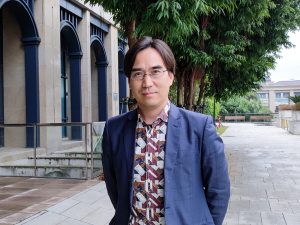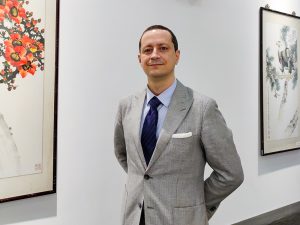It is not uncommon for undergraduate students to think about doing a PhD. What should you consider before embarking on a PhD journey? If you are determined to do so, what should you do to prepare yourself? Three PhD supervisors from different fields at the University of Macau (UM) recently spoke to UM Reporters and shared their advice to undergraduate students who want to pursue PhD studies.
Making Clear Goals
Chen Guokai, professor and associate dean of the Faculty of Health Sciences, says that pursuing a PhD means much more than earning a degree, and one should not go down this path just to avoid finding a job. According to him, pursuing a PhD is an important life decision. For this reason, students should set clear goals for themselves and think about whether pursuing a PhD will help to achieve their goals. He adds, however, that students need not panic even if they do not have a concrete plan before starting a PhD. ‘It doesn’t necessarily mean that you are wasting your time,’ says Prof Chen.
A PhD graduate from the Baylor College of Medicine in the United States, Prof Chen says he applied to study abroad to give himself a challenge in his university education. However, when he was accepted, he was not really sure if an academic career was indeed what he wanted. Fortunately, later in his studies, Prof Chen discovered that scientific research is full of unknown challenges, and he found them fascinating. Prof Chen gives the following advice to students thinking about doing a PhD: ‘Passion and hard work are the keys to success. You should also expand your horizons to the world and measure your work against international standards to motivate yourself.’
Setting Realistic Expectations
Gabriel Antunes de Araujo, associate professor in the Department of Portuguese, says that students who want to pursue an academic career should get in touch with their professors to find out the daily routine of an academic, as well as their particular pressures, income, and challenges when applying for research funding. ‘Being a professor is a tough job. You will have to read and publish a lot,’ says Prof Araujo. ‘When I teach courses on academic writing, the first thing I do is to show all my papers that have been rejected for publication. I want students to know that failure is a natural part of academic life.’
Born and raised in Brazil, Prof Araujo began his studies at the State University of Campinas (Unicamp) in March 1994. He knew from day one that he wanted to pursue a PhD and a career in linguistics research. ‘My professor gave me a lot to read. He said we would only work together if I finished all the reading. I did that two months later and came back to him,’ says Prof Araujo, who carried on to study for his master’s degree at Unicamp, before going on to pursue a PhD at the Vrije Universiteit Amsterdam in the Netherlands. ‘You should do a PhD only if you are really passionate about your subject,’ says Prof Araujo.
Staying Curious
Shao Huaiyu, associate professor in the Institute of Applied Physics and Materials Engineering, was admitted to a PhD programme at Peking University immediately after completing his bachelor’s programme at the same university. According to Prof Shao, doing a PhD is like ‘getting through a black box’. ‘As a PhD student, you need to do something that nobody has ever done. When you encounter a problem, even your supervisors may not have all the answers,’ says Prof Shao. ‘You will often be working on your own to figure out how to proceed with your PhD project.’
Prof Shao adds that students who have a genuine passion for research can consider applying to a direct-entry PhD programme. ‘Students in a direct-entry programme may receive their PhD degrees a few years earlier than master’s students who started at the same time. However, it’s often challenging to apply to and study for such programmes. This is because students with a bachelor’s degree usually have less discipline-specific knowledge, research experience, and training in academic writing than applicants with a master’s degree. For this reason, PhD supervisors may find it difficult to identify an undergraduate student’s research capability,’ says Prof Shao. ‘Undergraduate students interested in pursuing PhD studies should try to participate in research projects as early as possible. They may even try writing academic papers or experiment reports to gain research experience.’
Source: My UM ISSUE 113




